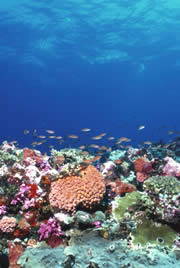|
The experts' warning comes in a report, published by the non-profit Pew Center on Global Climate Change, that sums up the potential impact of global warming on coral reefs over the next century. It was released at the American Association for the Advancement of Science meeting in Seattle.
Almost 15% of the world's reefs are already beyond repair thanks to global warming, the report says. Another 30% may be lost over the next 30 years, estimates Richard Aronson of Dauphin Island Sea Lab in Alabama, one of the report's authors.
Experts at the meeting urged governments and conservationists to act now to stem the tide of damage. As well as curbing greenhouse gas emissions, the authors recommend introducing ecosystem management plans that will cut the impact of fishing and pollution.
Some countries are already implementing reef conservation programmes. In Australia, for example, a law banning fishing on 30% of the Great Barrier Reef is expected to come into effect this year. The government has also backed a measure to compensate fishermen for lost revenues.
Triple whammy
Experts at the meeting explained how tiny sea anemone-like polyps build coral reefs by secreting brittle, limestone skeletons. Algae support the polyps by converting sunlight and carbon dioxide into sugars that feed them; the polyps, in turn, ooze waste products that nurture the algae.
The report says that global warming is harming coral reefs in at least three ways. Changes of just 1 or 2 °C can stifle the life-giving algae. Spiralling levels of carbon dioxide, a greenhouse gas, dissolve in sea water, creating an acidic cocktail that stops polyps oozing their skeleton. And warmer water makes the reef more vulnerable to other threats, such as overfishing, diseases and pollutants that drain into coastal waters.
"Global warming is tearing the heart out of coral reefs," says Terry Done of the Australian Institute of Marine Science in Townsville.
Marine biologists first noticed the widespread death of coral during the 1980s and 1990s. In 1997-98, global warming intensified higher ocean temperatures caused by El Niņo and wiped out some 16% of the world's reefs. Dying coral loses the healthy green-brown glow conferred by algae and pales to become white, a process called bleaching.
Warming waters are also nudging coral reefs north and south into previously cool waters, such as the shorelines of Florida and Texas. But because reefs take years to build up, this 'coral creep' cannot compensate for larger losses in the tropics, experts say.
Top
|
